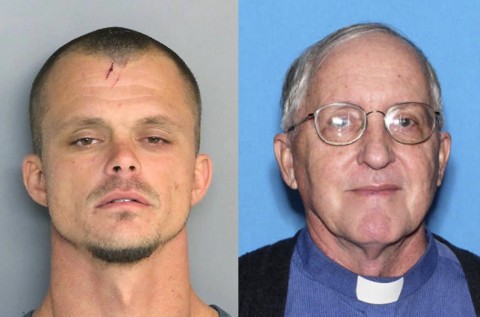
The Rev. Rene Robert spent his life helping the convicted and preaching mercy against those who face the death penalty.
He did not believe anyone, no matter how evil, deserves that fate – not even the man who is accused of killing him.
Robert, a Catholic priest in the Diocese of St. Augustine in Florida, was found dead with multiple gunshot wounds in April. Steven Murray, a repeat offender whom Robert has been helping as part of his Franciscan ministry, was indicted in May and could face the death penalty.
Three Catholic bishops are asking prosecutors to not seek capital punishment, saying it’s not what Robert believed in and not what he would have wanted to happen. More than 20 years before his death, the priest signed a document called “Declaration of Life,” which lists a series of requests that he would like fulfilled in case he is killed.
“I hereby declare that should I die as a result of a violent crime, I request that the person or persons found guilty of homicide for my killing not be subject to or put in jeopardy of the death penalty under any circumstances, no matter how heinous their crime, or how much I have suffered,” the document states. “During my life, I want to feel confident that under no circumstances whatsoever will my death result in the capital punishment of another human being.”
If Murray is convicted and sentenced to death, Robert said he would like the governor “to take whatever action is necessary” to keep his killer from execution, the document states. He also requested that the document, signed in 1995, be admitted as evidence at trial, and that his family and friends make sure his wishes are granted.
Catholic bishops from Florida and the neighboring state of Georgia will hold a news conference Tuesday morning outside the county courthouse in Augusta, Georgia, where the murder is alleged to have occurred, to try to persuade prosecutors to change their decision. Bishop Felipe Estevez, of the Diocese of St. Augustine, had gathered 7,000 signatures asking Georgia courts to honor the late priest’s wishes.
“As many people know, the Catholic Church’s position on the death penalty, we don’t feel that a person should be put to death. It’s violence against violence. We’re not in favor of that,” said Kathleen Bagg, a spokeswoman for the Diocese of St. Augustine. “Father Rene was a strong opponent of the death penalty. He would attend death penalty vigils.”
But it’s uncertain whether the priest’s wishes will be granted.
Former district attorney Ashley Wright, who was recently appointed to a judicial post, told the St. Augustine Record in June that decisions on punishment are not based on public opinion or sentiment.
“We are not supposed to take into account the individual circumstances of the victim when we are talking about whether someone’s case is worthy or not worthy of seeking the death penalty,” she told the paper.
Acting district attorney Hank Syms did not return a call from The Washington Post on Monday.
Murray’s public defender, Ryan Swingle, said he hopes the priest’s wishes are considered.
“I think the ‘Declaration of Life’ that Father Robert drafted and memorialized is an important and inspirational statement by a man that clearly cared very deeply in the works of the Church,” Swingle said. “I admire it.”
David Shoar, the sheriff of St. Johns County in Florida, said he has known Robert for 30 years. The 71-year-old priest had devoted his life to helping people, especially those in jail and suffering addiction. Shoar believes Robert had been reckless at times and trusted people a little too openly.
For example, Robert had given people money, invited them to his home and run errands on their behalf, like going to a Western Union to pick up checks, Shoar said. At times, he had ended up walking home because he had let someone borrow his car.
Shoar said he had warned his friend on several occasions.
“Not that it was wrong to help, but you got to be smart about it,” Shoar said. “He saw the good in too many people and he paid for it with his life.”
![[Photo by: Sheriff's office from Aiken County in South Carolina and St. Johns County in Florida — Handout]](https://breaking911.com/wp-content/uploads/2017/01/imrs-6-1.jpg)
Authorities said Murray kidnapped Robert, forcing the priest into the trunk of a vehicle, and drove nearly 300 miles from St. Augustine to Augusta. They believe Robert was killed on April 10. The priest was reported missing two days later.
Murray’s sister Bobbie Jean Murray told investigators that she suspected her brother did something to the priest, according to an incident report. A neighbor told detectives that a man who fits Murray’s description was at the priest’s apartment on April 7 and 8.
At one point after the priest disappeared, Murray called his sisters, Bobbie Jean and Crystal. In one of the phone conversations, which were recorded, Murray admitted killing Robert, according to the report.
Murray was arrested April 13. Robert’s body, which had multiple gunshot wounds, was later found in rural Burke County, Ga., according to media reports.
The criminal case is still pending and has not been scheduled for trial, Murray’s attorney, Swingle, said.
(c) 2017, The Washington Post · Kristine Guerra

